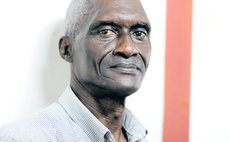"Does Dominica have a color problem?"

Nowadays in Dominica, our daily wardrobe choices have become 'identities'. I notice that when I wear blue or red people comment as if they have the power to influence my wardrobe choices. It seems that "Eipigh" the human suddenly becomes invisible in their eyes. Instead I'm replaced by a color-coded, party-political identity UWP-ite or Labour-ite. Friends tell me they often make a conscious effort to wear 'neutral' colors. Blue and red have become definitional. They're suddenly more than just colors. They do more than indicate what political party you may support. They now 'identify' you and mark you as potential friend or foe.
The use of colors in political symbolism is not new. On the killing fields of ancient politics where power was brokered primarily through war (or the threat of violence), colors were often used to distinguish one army from the other. The practice continues though less bloody in such modern day equivalents as team colors in sports. Nevertheless, whether it is war, sports or politics, the use of color to identify opponents, enemies or 'the other side' only accentuates division and conflict. This activity eventually dehumanizes by reducing people to oppositional existences.
These days blue and red flags litter the aerial landscape making of our Nature Isle a "war –zone" of colored flags. As I drive daily thru St Joseph, Mahaut, Massacre or travel around the country, I ask myself who will clean up this rubbish? Just as seriously I wonder, who really benefits from this escalating 'color-consciousness' as the flags get more numerous and indiscriminate.
I know that 500 years of physical, mental and economic oppression tends to make us feel somewhat uncomfortable with our identities, as people of either Afrikan or Kalinago descent. Then and now empowering information is kept to a minimum whilst negative images and stereotypes are still regularly used against us whether on the streets, in the classroom or in the media; moreover, we often buy into this dehumanization ourselves. Small wonder then, that we so easily accept the blue or red "pseudo-identities" that those purveyors of influence enthusiastically promote at election time and beyond.
What does it really mean to be a, uwp-ite or a labour-ite in 2014? Who benefits from these blue and red pseudo-identities? Who benefits from the buying and selling of the colored party-political 'identity' paraphernalia ie; billboards, flags, t-shirts, caps etc. Ultimately, the profit ( political and economic) largely goes to the heirs locally and overseas of those people who bought, sold and enslaved my ancestors. We have forgotten that the identities of our ancestors (Kalinago and African) were falsified in similar ways to dehumanize, enslave and control them. Color coding was also effectively used against them especially where social cohesion threatened the welfare of those convinced of their divine right to control.
In Dominica, the imposition of party colors to the level of static identities (uwp-ite, labour-ite) is troubling. I find it objectionable how these political pseudo-identities are used to divide and rule a people who share common histories and common interests regarding economic independence in an environment that is especially hostile to agricultural production and self-definition.
The use of colors, are a means of non-verbal communication and color-coding is utilized in the modern political arena where voter illiteracy is high. What this means is that most political parties tend to downplay engaging with voters through meaningful dialogue in forums that allow for exchange, learning and sharing of information on policies and plans. Instead these political parties resort to mega-rallies where the main objective in order of priority is a colored body-count, name calling and labeling. The result is "no questions asked, no answers given."
The danger of fabricated party political pseudo-identities means that we can easily turn a blind eye to people; to shared interests, to common futures, to the possibility of working together. The mind of the beholder uses color and other labels to objectify (remember the 2008 infamous Tony Astaphan's "cacador" speech) rather than humanize by seeing one another as a sister, brother, neighbor, friend or partner. History has shown that depersonalizing and objectifying people makes it much easier to commit acts of physical and non-physical violence against them. That was also the strategy used to legitimize, the injustice and barbarity of the Trans-atlantic slave trade and colonialism for over four hundred years. More recently, the massacres in Rwanda, Bosnia and elsewhere have been linked to the systematic depersonalization of one group by another.
In my opinion only a small manipulative elite, truly profit from such political strategies which emphasize antagonistic pseudo-identities. In the process the "psyche" of the Nation is infected and permanently scarred; and when the fallout comes as usual it will be our brothers and sisters who have internalized these false identities who will suffer the most. We must remain eternally vigilante to identify and expose those who would want once again to use this false "colour-consciousness and pseudo-identities" to divide, violate, dehumanize and rule over us.
May the spirits of my ancestors, be pleased.
Dr Irving Eipigh Pascal.




